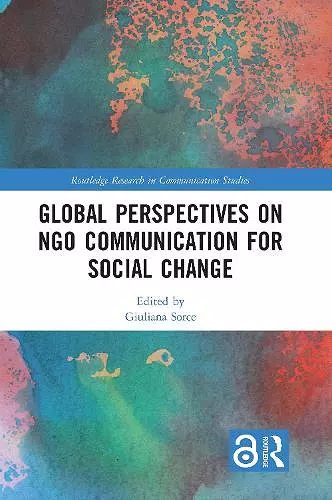Global Perspectives on NGO Communication for Social Change
Format:Hardback
Publisher:Taylor & Francis Ltd
Published:4th Nov '21
Currently unavailable, and unfortunately no date known when it will be back

This book examines the central role media and communication play in the activities of Non-Governmental Organizations (NGOs) around the globe, how NGOs communicate with key publics, engage stakeholders, target political actors, enable input from civil society, and create participatory opportunities.
An international line-up of authors first discuss communication practices, strategies, and media uses by NGOs, providing insights into the specifics of NGO programs for social change goals and reveal particular sets of tactics NGOs commonly employ. The book then presents a set of case studies of NGO organizing from all over the world—ranging from Sudan via Brazil to China – to illustrate the particular contexts that make NGO advocacy necessary, while also highlighting successful initiatives to illuminate the important spaces NGOs occupy in civil society.
This comprehensive and wide-ranging exploration of global NGO communication will be of great interest to scholars across communication studies, media studies, public relations, organizational studies, political science, and development studies, while offering accessible pieces for practitioners and organizers.
If you believe that the well-being of a nation or a community can be gauged by the quality of its civic discourse, and further believe in mechanisms that enable ordinary citizens to express themselves through discussion, debate, and dissent, this edited volume is a must read. Taking a global, national, and local perspective, this book investigates, analyzes, and interrogates the role that media and communication can play in the workings of Non-Governmental Organizations (NGOs), and provides invaluable insights on how they enable citizen involvement, shape public debate, engage stakeholders, advocate for public policy, and orchestrate members of a civil society. In a world awash in a discussion of public policies and programs, this volume, aptly, puts the citizen at the center.
Arvind Singhal, Samuel Shirley and Edna Holt Marston Endowed Professor of Communication at the University of Texas at El Paso, USA; also serving as the William J. Clinton Distinguished Fellow at the Clinton School of Public Service, University of Arkansas at Little Rock, USA
Global Perspectives on NGO Communication for Social Change compels us to recognize the significant work of nongovernmental organizations (NGOs) in strategic communication for social change. Historically we have witnessed scholarship on the subject of communication and development along with emerging attention to social movements, but this volume highlights the contributions of NGOs in mobilizing participation, navigating states from passive to repressive, soliciting funding, attracting news attention, and more. The diversity of talent, site, and subject create a compelling volume of case studies and insightful concepts. These chapters are united in their approach to advocacy and concern with critical social issues, such as gender equality and rights, climate, migration, refugees, and labor.
Karin Gwinn Wilkins, University of Miami, USA
Global Perspectives on NGO Communication for Social Change arrives at a time when the need for it has never been greater. Democratic deficits around the world, the entrenchment of authoritarian tendencies, urgent humanitarian crises, and new health inequities caused by the COVID-19 pandemic make it clear that collective engagement on issues that affect the public good has never been greater. This book rises extremely well to the exceptional challenge that has been laid before it by examining how NGOs represent and harness community voices and maneuver their way around an increasingly complicated, fraught and fragmented media environment. In the very best tradition of global communication studies, it contains perspectives from authors who base their work across five continents and who represent universities in nine different countries. The chapters contain careful examinations of how NGOs develop media and communication strategies, represent and advocate for marginalized groups, and bring hidden injustice into the public domain. The book is an excellent resource not only for scholars interested in the study of NGOs and global media and communication, but also for NGO strategists, journalists and activists who are keen to understand the complexities of reporting on and advocating for social change in the midst of the chaos of the current age.
Shiv Ganesh, Professor at Moody College of Communication, The University of Texas at Austin
ISBN: 9781032037134
Dimensions: unknown
Weight: 453g
206 pages